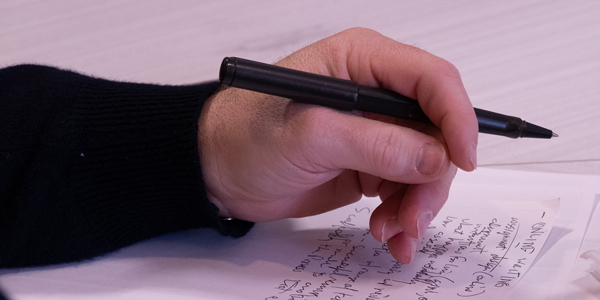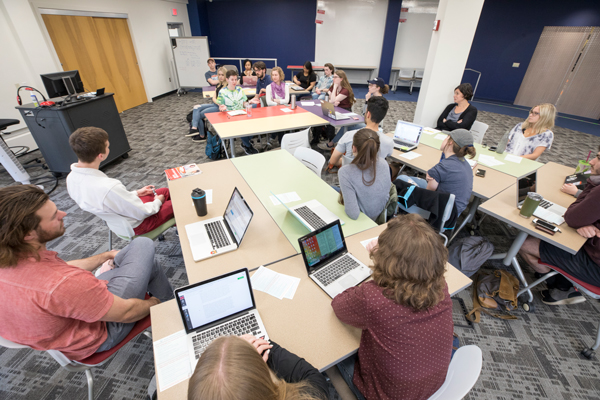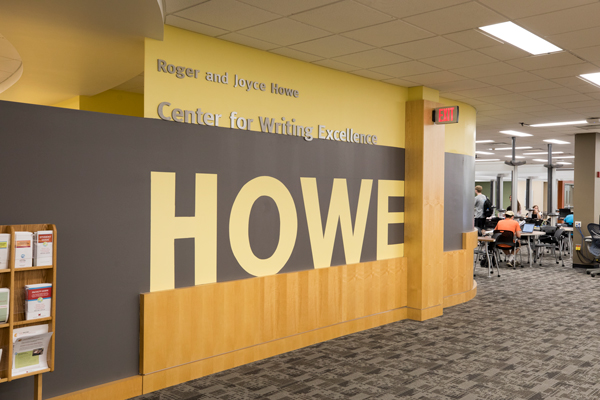An invitation to be bold
Mesa Community College adapts Miami’s University’s innovative Howe faculty development

“Mind blowing.”
“Transformative.”
“The best professional development I’ve had in 20 years.”
When Alex Arreguin and Stacy Wilson read the feedback from some of their Mesa Community College faculty colleagues, they knew they were onto something. These comments were proof that Arreguin had made the right decision in reaching out via an unsolicited email, the digital equivalent of a cold call, one day to Miami University’s Elizabeth Wardle.
As director of the Howe Center for Writing Excellence, Wardle has led the charge at Miami in promoting deep change around teaching and learning since 2016. She’s even written books about it, including the recently released “Changing Conceptions, Changing Practices: Innovating Teaching Across the Disciplines,” and “Writing Expertise: A Research-Based Approach to Writing and Learning Across Disciplines,” both of which she co-authored.
“Changing Conceptions, Changing Practices” describes a method for helping faculty change teaching and learning in radical ways across their programs – and illustrates the results of that method with cases from Miami faculty. The method described in “Changing Conceptions” is enacted at Miami through the Howe Center’s Faculty Writing Fellows Program, which works with teams of faculty across extended periods of time. The Howe Center is able to pilot such innovative methods due to a generous $15 million endowment from alumni Roger ’57 and Joyce Howe ’57.
The Howe Center, like other Miami programs, enacts Miami’s mission of empowering faculty to ensure student success through deep learning. Miami’s top 10 ranking in commitment to undergraduate teaching (U.S. News & World Report 2022) among public universities is evidence of its unwavering commitment to undergraduate education. Each year, more than 2,000 students work with professors on funded research, and the university offers many internship opportunities, all part of Miami’s encouragement that students become engaged citizens who use their knowledge and skills with integrity and compassion to improve the future of our global society.
In the Howe Center’s Fellows Program, faculty work in teams and draw on their disciplinary expertise to revise curricula and courses. More than 140 Miami faculty members from every division have completed the Fellows program since 2017, and the Howe Center continues to support them with reading groups, specialized follow-up workshops, and grants.
What Arreguin wanted to know, and why he “cold-called” Wardle, was whether an approach that has been so successful at an institution like Miami would also work at Mesa Community College – an open-access, Hispanic-serving 2-year institution.

Bringing the Howe method to Mesa
The Howe Writing Across the Curriculum (HWAC) is the faculty-focused portion of the Howe Center, providing innovative, research-based teaching support . Wardle and her team concentrate on innovating methods for teaching – and recently have even begun inviting alumni and employers to continue learning and connecting with the Howe Center through the Miami Writing Institute.
The Howe Center’s philosophy for all of its work is to change conceptions first: “We need to change our ideas about teaching and learning, and then our practices will change in response,” Wardle said. “What we focus on in the Howe Center is programming that gives faculty members the time and space to think in new ways.”
The Howe Fellows program is the “jewel” in the crown of the Howe’s work, and Wardle and her colleagues have been increasingly presenting and publishing about it around the country. That is how Arreguin and Wilson first learned about the program.
“We knew about [Wardle] first, and her scholarship was something we were familiar with,” Wilson said. “She is definitely an expert in her field. We had looked at other programs at other institutions that were focused on writing across the curriculum, and the Howe Center came up.”
Arreguin and Wilson reached out to Wardle and asked if they could learn more about the Howe Fellows method. They subsequently sat in on two different cohorts of the program and decided it was a method they wanted to adapt for their own institutional context. Part of the Maricopa County Community College District, Mesa is the largest of 10 community colleges in the Maricopa system. Mesa’s focus on two-year degrees, occupational programs, and open-access mission make it in many ways a world apart from Miami, a “public ivy” with a focus on the liberal arts and a fairly affluent student population.
Thus Arreguin and Wilson worked with Wardle to consider how to adapt the Fellows model to the specific needs of their student and faculty populations.
“Those factors definitely prompted us to make some changes to the curriculum, but the curriculum stayed true in terms of its emphasis on different theoretical frameworks,” Arreguin said. They piloted the program at their institution in summer 2022, with resounding success.
“There is a wealth of knowledge we have learned throughout the process to where this has really become a partnership,” Arreguin said. “There are some aspects that Miami, and specifically Liz, are learning from us. We are creating processes through experience because we understand the context here, what stayed true, what are the shifts, and what changes that we had to make.”

Partnering for deep, meaningful change
The partnership between Arreguin, Wilson, and Wardle continued in January 2023. Wardle led the day-long convocation for the Maricopa County district, remotely reaching over 600 faculty from all 10 community colleges in the system, who were gathered by “fields of interest” in person on five separate campuses and online in 45 Web Ex breakout rooms.
Wardle first gave an interactive talk explaining threshold concepts and teaching for an inclusive curriculum, and then facilitated a two-hour workshop in which faculty sought to identify shared “threshold concepts” for their field of interest. The day concluded with a panel featuring faculty from both Miami and the Mesa system.
Wardle, Arreguin, and Wilson continue to collaborate, seeking to share this model of transformative faculty development with other institutions. The collaboration all hinged on that first leap: “Liz was very generous in these conversations,” Wilson said. “She never hesitated to say ‘Come on in, let me share this.’ That has made a world of difference. It started with her answering an email and saying yes.”
Resources for enacting this method
The Fellows model was a natural fit for Miami, which innovated the concept of Faculty Learning Communities many years ago: “This model of faculty teams working to improve teaching is totally normal at Miami,” Wardle said. “I haven’t had any trouble recruiting anyone to participate in Fellows. They came right away and then went and told other people. I think that’s part of what makes Miami special.”
But the fact that the model is also working well at a very different institution is an exciting affirmation that there are methods for deep change through faculty development that can work across different contexts.
Wardle’s two recent books provide resources for other institutions seeking to enact this model for deep change. “Changing Conceptions, Changing Practices” outlines the method and heuristic, describes the theoretical frame for helping faculty engage in sensemaking for deep change, and features contributions from Miami faculty who have been through the Fellows program. The book asks: how do we make deep, meaningful change in our curricula when the larger culture of higher education rewards efficiency and accountability?
“Writing Expertise” is more of a “working book” that faculty developers can use as they implement workshops and seminars like the Howe Fellows program. Together, these two books provide a toolkit for other institutions seeking to emulate what Miami and Mesa have done.
“As other stakeholders see this in action, I think this has the potential to become something that doesn’t just impact our college here, but impacts the 10 colleges around our district,” Arreguin said.
Added Wilson: “We’d love to see more of these programs and projects. What’s happening with Miami and Mesa, let that be an example of two very different institutions – geographically, population-wise – working together. How does this happen? It’s an invitation to be bold and be open to partnerships beyond your institution.”